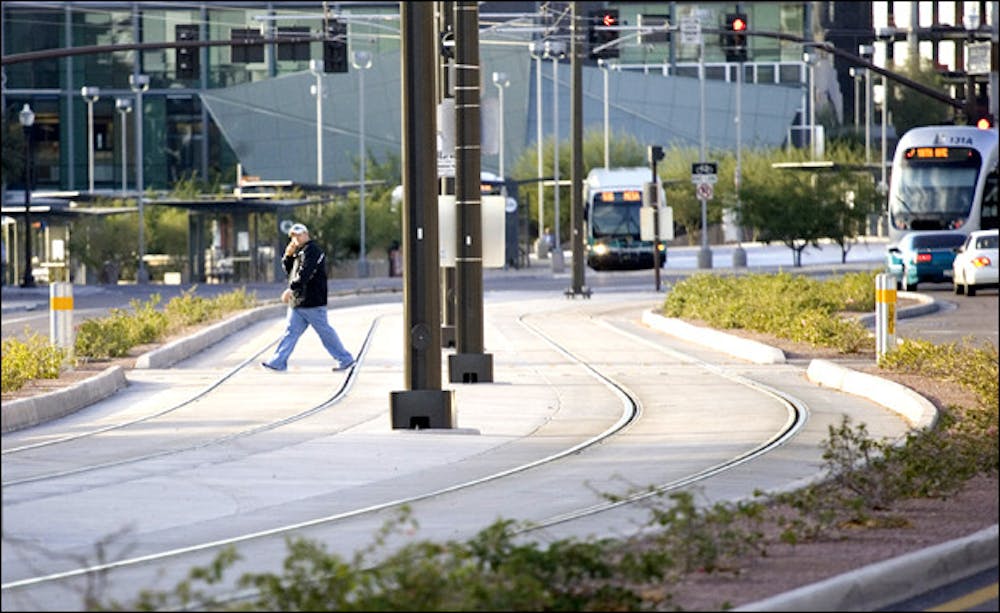As more than 51,000 students flood back to the Tempe campus, ASU and Tempe police are collaborating to inform students about new light-rail safety laws.
During this first week of the semester, officers will warn students, faculty and staff of traffic laws around light-rail stations, but issue no citations.
Next week they will begin issuing citations to violators.
ASU police Sgt. Michele Rourke said one of the most common violations is walking on or jaywalking across light-rail tracks.
In both Tempe and Phoenix, the fine for jaywalking on light-rail tracks is $156.
“Floods of students crossing the street was dangerous before, but crossing the tracks is even more dangerous,” Rourke said. “Even the [light-rail] horn is not particularly distracting or distressing.”
Rourke said officers’ main focus is changing behavior that students already have, like crossing streets or tracks without paying attention.
“Their minds are on other things,” she said. “They just got out of class — they’re listening to their iPods or texting.”
Tempe police spokesman Sgt. Steve Carbajal said students are often distracted by technology.
“Literally the big thing is just paying attention,” he said. “It goes back to what you learned as a child: Look both ways before you cross, and do it in the right place.”
Pedestrians must cross tracks in designated crosswalk areas. Crossing in other places is considered jaywalking.
Rourke said she has watched students walk along the tracks while listening to music or talking to friends without realizing trains are behind them.
“I don’t want the first person hit by a [light-rail] train to be an ASU student,” she said.
Metro is placing ambassadors at key stations this week where the influx of returning students will increase ridership, especially from Tempe to Phoenix, Metro Light Rail spokeswoman Hillary Foose said.
“We’ll have ambassadors to help [students] navigate and remind them of safety,” she said. “Safety is always our first concern.”
Because of testing throughout last semester, Foose said many downtown students have already had experience with the trains.
In Tempe, education and enforcement around light-rail stations began in September during the trial runs.
“We gave people time to get used to the laws during testing,” Carbajal said. “Word has been out there, and we will not accept the ‘I didn’t know’ excuse.”
Jaywalking on or across tracks is one of the more common violations the Tempe police department has seen, Carbajal said.
Tempe police has issued more than 50 tickets to drivers, bicyclists and pedestrians breaking light-rail traffic laws.
The ASU police department has yet to issue a ticket, Rourke said.
Recent ASU graduate and light-rail commuter Andrew Stravitz said students can cross reasonably.
“I’ve gone to ASU for a while, and I wouldn’t put it past ASU students to be flighty [and cross dangerously],” he said. “But $156 is an exorbitant price.”
Stravitz said what matters is not whether the fine is fair or unfair, but rather what is right and wrong according to the law.
“This is different than a parking fine, more weighty of an issue,” he said. “It puts more than just you at risk. People could be killed.”
Reach the reporter at tessa.muggeridge@asu.edu.




